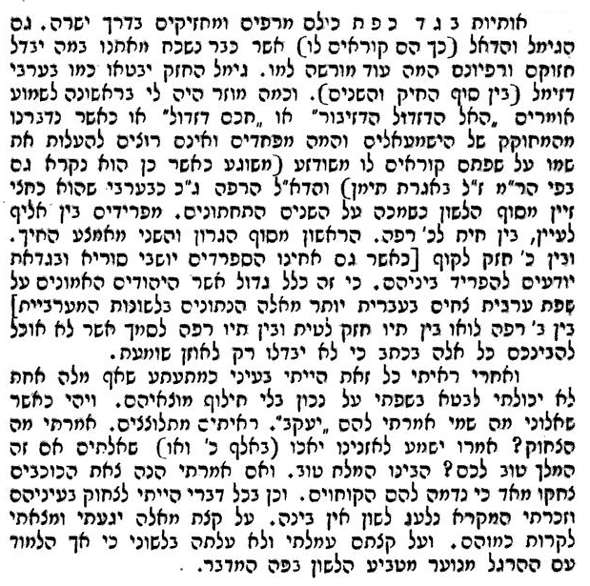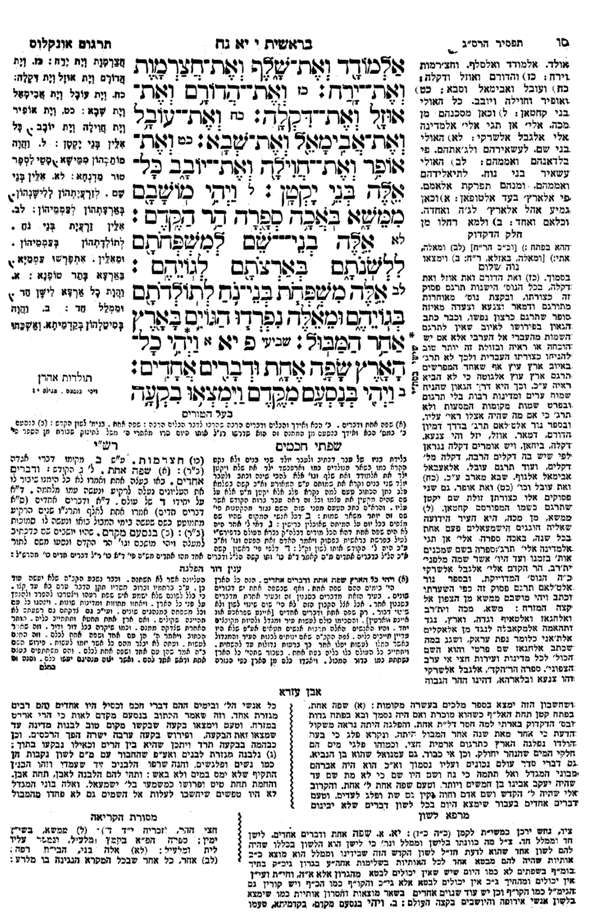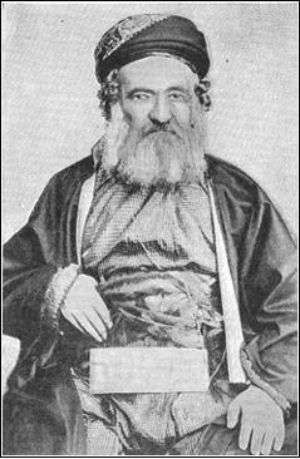Although there are few revelations today in the excerpts I am posting below, when R. Jacob Saphir's travelogue אבן ספיר was published in 1866 (vols. I and II) it was a fount of exciting information about Jewish communities which were little known to other Jews. Saphir (1822-1886) had a very good eye and ear for detail. He also happened to have been a distinguished talmid chacham and was therefore able to put all he saw into a useful context. He was also a very fair critic, noting the strengths and weaknesses of the communities he visited. The result was a very valuable, celebrated book.
Much was made of his travels in Yemen (1858), whose Jews were at most only slightly known to the rest of Jewry. As a rabbinic emissary from Jerusalem, he was well received by the Yemenite Jews. Below is an excerpt concerning their traditional pronunciation of Hebrew which was likely totally unknown to the general public at the time.

Earlier, in discussing their Torah knowledge he begins by noting that almost all the Jews of Yemen are not bereft of Torah knowledge. They understand Scripture, know halacha and aggadah, know passages from the Zohar, and study Kabbalah. However, they really don't know Talmud and Posekim very much. In fact, probably only one in a thousand even knows what a page of Talmud looks like, and this is because Gemaras are barely found in Yemen (although En Ya'akov is not uncommon). He then notes that what they do study is the Rambam's Mishneh Thorah, which is where all their halachic practice is derived from, whether stringencies or leniencies. They told him that their allegiance to the Torah of the Rambam dates back to the time of his Epistle to Yemen. Prior to this time, they claimed, they used the Talmud alone for deriving their praxis. This is what I mean by his judgment being fair; it's not too difficult to imagine another writer having only contempt for a community which neglects the study of Talmud and Posekim. On the other hand, they presented so much that could only leave a foreigner awestruck that perhaps anyone else would also have reacted the same way. Of course I also leave it up to the more knowledgeable expert in Yemenite Jews to confirm or deny his contention that they knew very little Talmud and Posekim. It is certain though that he wrote what he believed he saw.
He began this section noting that the Yemenite Jews all know how to read the Torah most correctly, with its proper syllables and accents and cantillation. He relates that up to the present the holy custom or earlier times, which is really the law in its most proper manner, is that all who are called to the Torah read it themselves - if one cannot read then he is not called to the Torah. For this reason the first thing they teach their small children is to read the Torah in this way, to the point where they literally have it memorized. In addition, they still have the venerable custom of old of publicly translating the Torah as it is read. They employ a 9 or 10 year old boy for this purpose, who translates each verse as it is read from the Torah. They do this also for the haftarah, which is read with a most beautiful tune. He also notices that they are extremely exacting in their reading, whether it is Bible, Targum or their studies in other books - in all these each syllable and accent and jot are read beautifully, as in [what Saphir imagines/ assumes] days of old. At one point Saphir relates something that amazed him, but was apparently perfectly normal. One shabbat (or should I say shabboth?) there was a want of a manuscript to read the haftarah. So the 18 year old cobbler who was serving him recited it (from 2 Kings 7) perfectly by heart.
He reveals what must have then been the surprising fact that they didn't read Hebrew like the Sephardim or Ashkenazim, in fact, their pronunciation omitted the faults of both these pronunciations. After detailing all the faults of these pronunciations, and blaming it on the negative impact of the vernacular speech of the respective Jewries, he writes that such is not the case of our brethren in Yemen, where Arabic - a daughter language of Hebrew and a sister langauge of Aramaic - is supreme. Also, he claims, their remoteness since settling there after the first expulsion in the Biblical period (for he uncritically accepted their own origin myth) ensured the long survival of extremely ancient customs handed down through tradition. One of these is to raise their children from the earliest age to pronounce Hebrew with its correct grammar and accents until it's nearly their mother tongue.
Now Saphir gets a little self-deprecating. He writes that until he met them he believed he was an exacting reader, a speaker of a clear Hebrew. And in fact he had exerted great effort to train himself, this Lithuanian-born resident of Jerusalam, to read the consonants and syllables properly. So when he first met them he didn't understand what they were saying and he thought, "These brothers of mine are butchering the Hebrew." And they laughed at him and informed him "You're butchering it. We are clear, and our Hebrew is the tradition." Can you imagine what a revelation this was? - or at least what sort of food for thought? Imagine that you were totally unaware of how the Yemenite pronounced Hebrew. Either way, Saphir writes, that they could barely understand each other. It was only with a lot of effort and training his ears that he could understand them and then he comprehended that they were in fact most exacting speakers. He then proceeds to elaborate their manner of reading Hebrew, a part of which is excerpted above.
He writes that they pronounce all of the BGD KPT letters in the strong and weak fashion, as is proper. Even the Gimmel and Dal (which is what they call the Dalet) which was forgotten by the rest of the Jews. The strong Gimmel is pronounced by them like the Arabic Jimmel. How strange it is to hear, at first, "Ha-el ha-jadol ha-jibor" or "Hakham jadol" or - referring to Muhammad, whom they are afraid to speak of openly by name -"meshuja." And the Dalet rafeh they also pronounce in Arabic fashion, something like half a zayin (he means /th/ as in /them/). Also, they differentiate between Aleph and Ayin as well as between Het and Kaf rafe. But they also distinguish between the strong Kaf and a Quf (just as the Syrian and Baghdadi Jews do). Saphir attributes this too to the (positive) impact of Arabic. In addition, they distinguish between Bet rafe and Vav, between strong Tav and Tet, between Tav rafe and Samech - but these can't be explained in writing. Can you imagine how tantalizing that was to readers?
Here's the funny part: after getting it all straight, it became apparent to Saphir that he could not pronounce even one letter the same as them. "When they asked me my name, I said "יעקב." They laughed, so he asked him what was so funny. They responded that they heard "יאכו." When he asked them "Is your king (מלך) good to you?" they heard "Is your salt (מלח) good to you?" If he told them "Hey, it looks like stars are appearing (צאת הכוכבים)" this struck them as hilarious because it seemed to them that he had said "קוחוים."
There is much more that can be excerpted from this interesting chapter, but just a couple of more remarks. Saphir writes that although just about all of them were really experts in Bible he didn't find any who were expert in grammar per se. Rather, they knew the language perfectly but without understanding the reasons (sort of like a native speaker). To this he attributes the paucity of grammatical texts. In my opinion this gives lie to the contention that in contemporary yeshivos kids can't really learn Hebrew well, because it is so difficult to teach them dikduk. In fact, there is another way of acquiring the language, through the back door as it were.
Saphir relates they they were watching him as carefully as he was watching them. They were most interested in the things he did and the way he spoke. So it was that one time he was being listened to while reciting Boreh Nefashos (the blessing after a drink or light refreshment). When he closed with ברוך חֵי העולמים they were very surprised, and begged his pardon in a most respectful way, מחילה מכבודך חכם! The problem was that he - like almost all Ashkenazim - read "Blessed is the life-giver of everything" using the form חֵי, which is plural. As prooftext they cited 2 Kings 2:2, which to them indicated that in any reference to God the singular, חַי, must be used. Thus, in their view, he should have said ברוך חַי העולמים, for the form he recited was a blasphemous compromising of God's unity. As it happens this is a very big discussion, which Saphir was aware of, and proceeds to discuss in the book, but to avoid the debate and many future repetitions of this incident he decided to read חֵי in the future. (The issue was well known to Ashkenazim liturgists and grammarians, and discussed by them. See for example, the comment in the Siddur R. Shabbetai on Baruch She'amar.)
Finally (for this post), Saphir was an expert Torah scribe (sofer) and an expert in the exact details of the Bible text. In fact we have him to thank for his early interest in the Aleppo Codex and the extremely valuable information about some of its readings which is preserved for posterity thanks to him (see here). He knew his stuff. So he examined Yemenite Torah scrolls and learned that they contained several variants from the Torah scrolls of the rest of Jewry (something Yemenite scholars were themselves aware of). So it was that when he purchased a Yemenite Torah scroll, he checked it and corrected those variants (as well as the stray mistakes that you find in any scroll that you check carefully).
But in a footnote he admits that this was a mistake, for the year before (1864) while in Paris he was shown by Senior Sachs (gasp!) a manuscript of a work called Qiryat Sefer by R. Menachem Ha-meiri all about the laws of Torah scrolls. These very variants were listed as the correct readings found in the famed Codex Hilleli. Thus, Saphir found independent confirmation of their scribal tradition, and regretted that he had changed it in his own Yemenite scroll.
Regarding pronunciation, in Aharon Gaimani's very interesting article 'Rabbinic Emissaries and Their Contacts with Yemenite Jewry' an instance of the Yemenite point of view is highlighted. Written in a manuscript work called מרפא לשון, of an 19th century Yemenite rabbi named Yihye Qorah, is the following (Gaimani's translation):
Once an Ashkenazi asked me about a book in front of me, and he would say זֵיוּרְכַיִם. And I did not know what this meant, and he would repeat it two and three times. And he finally showed me in writing, and behold he was saying זה אורח חיים.Gaimani further points out that this little gem is only found in the manuscript (and in books citing it). When the מרפא לשון was itself printed in the Yemenite Chumash called ספר כתר תורה הנקרא בלשון קדמונינו תאג i(1990 edition with additional commentaries) the line is missing! It does include a little aside about how Europeans can't pronounce all the letters though. See the last lines below:

Finally, it's pretty cool that one of the copies of Even Sappir on Google Books has his autograph:

This is from the copy at the Princeton Library. The Harvard Library copy? Nothing.

